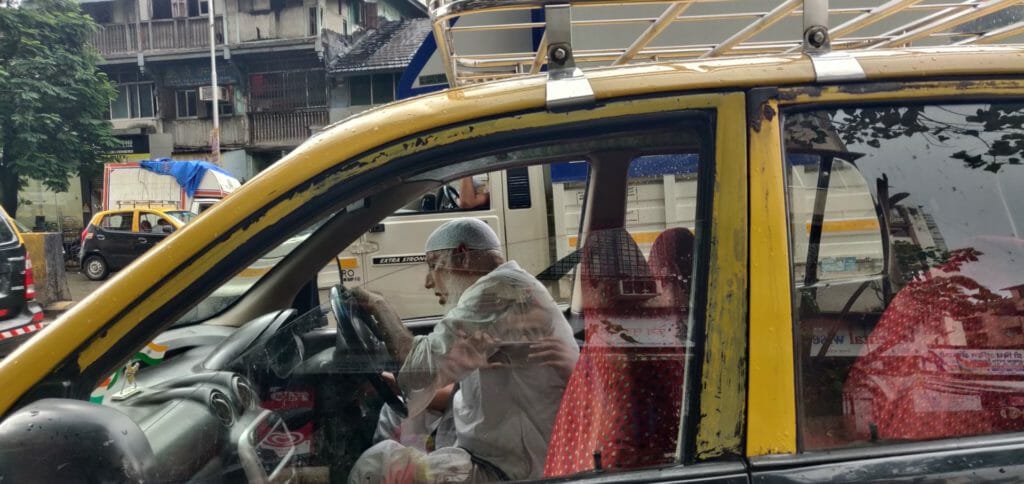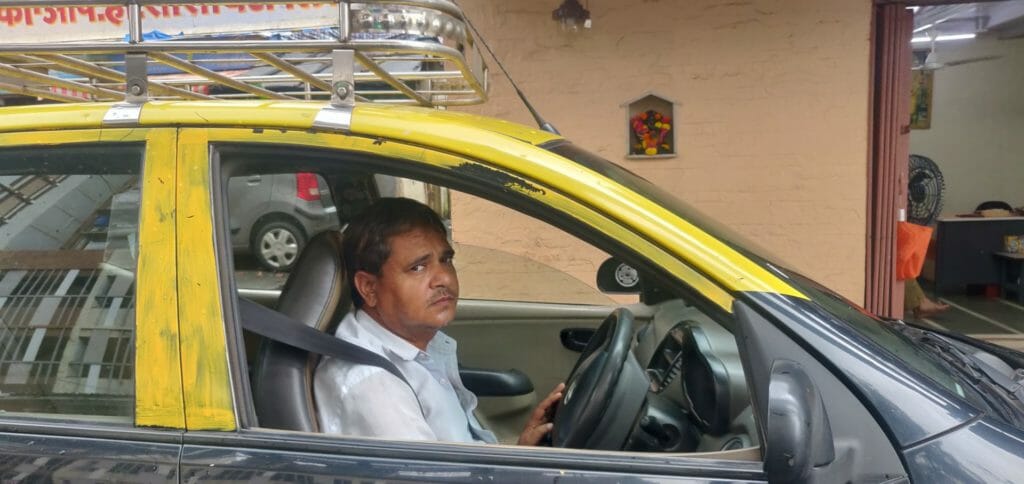65-year-old Sain Ullah Khan has been driving a taxi in Mumbai for the last 35 years, but his life turned upside down during the COVID pandemic, in 2020. Two years ago, the lockdown took away his income and savings and now he is troubled by high Compressed Natural Gas (CNG) prices.
“I used to take Sundays off before the lockdown and work only till noon on Fridays but that has not been possible for the past two years. If I take an off now, we’ll be left hungry. Eid is the only time I can afford a holiday,” says Khan. Having to work without a day to relax has taken a toll on the health of taxi drivers like Khan. “I have a terrible pain in my waist and my back, I’m functioning because of some medicines the doctor gave,” he says.

There were around 56,000 black and yellow (kaali peeli) taxis in Mumbai up until 2016 but media reports suggest this number dropped to 44,566 in 2018-19. The number of auto rickshaws registered in Mumbai has increased over the past few years, in 2016 the number was 1.06 lakhs and by 2019 the total was 2.07 lakhs. The city’s autowallahs and taxiwallahs switched to CNG in the early 2000s after a Bombay High Court order; it soon became the preferred alternative to diesel or petrol as it gave better mileage at a relatively cheaper rate.
Read more: Last mile connectivity still a problem for Mumbaikars
The rise in CNG prices
In the past, the increase in CNG prices has been slow and steady. For instance, from 2011 to 2012, the price for 1 kg CNG was between Rs 30 to Rs 35 and it gradually increased and touched Rs 48 in 2021. In March of that year, the base fare for taxis was hiked to Rs 25 from Rs 22 and the base fare for autorickshaws was hiked to Rs 21 from Rs 18 to match the rise in CNG prices.
As opposed to the earlier trend, the CNG price shot up rapidly to Rs 80 per kg just a year later while the base fare remained the same. The rise in the price began in April this year when the central government increased the price of domestic and imported natural gas by over 110%. The news report also states that Mahanagar Gas, the CNG and piped natural gas distributor in Mumbai, attributed the rise in CNG prices to a sharp increase in other required costs as well as to a fall in the value of the rupee.
Warning of a strike
The Mumbai Taximen Union demanded a hike of Rs 10 in the base fare and had given a call for an indefinite strike on September 15th. However, the strike was postponed after various union members were promised a hike within the next 10 days in a meeting with Maharashtra’s Industry Minister Uday Samant.
Soon after the meeting, the Minister tweeted, “Today a meeting was held in the Ministry with representatives of various rickshaw-taxi associations. The unions have decided to call off the strike on the 15th. During the meeting, fare hikes, welfare board, vehicle loans, rickshaw stands, parking stations, and the appointment of study groups, among other things were discussed positively.” Harshdeep Kamble, Principal Secretary (Industries), was unavailable for comment while Ashish Kumar Singh, Additional Chief Secretary (Transport & Ports), was unreachable on the available phone numbers.
“They have not told us by how much the fare will increase but I am confident that they will keep their word and hike it in coming days,” says AL Quadros, general secretary of the union.
While speaking to this reporter at the Taximen Union office at Mumbai Central, 80-year-old Quodros slams his hand on the desk when asked what would the union do in case the government fails to provide relief and says, “They can’t do that. I have warned them twice that I will give a call for a strike. If that happens, taxi drivers in entire Mumbai will stop work for as long as I tell them to stop.”
The Union has now called for an indefinite strike from September 26th, after waiting a week in vain for an announcement of a fare hike.
Everything is expensive today
“We used to save about Rs 400 to Rs 500 daily earlier but that has now stopped. When CNG was Rs 48 per kg and meter was Rs 25, we could drive a good 100 km on Rs 400. The amount earned used to cover our expenses as well as cover the taxi owner’s expenses,” says Sanjay Gupta, who has been driving a taxi in Mumbai since 2004.

He points out that it is not just the CNG prices that have increased dramatically but cost of car parts required for maintenance and rates of other basic commodities have gone up too. “We are facing losses of at least Rs 350 every day. I am constantly under pressure. Income should increase with time but it is the opposite now,” he says.
Demand for subsidised CNG prices
The drivers are desperate for a hike at this point but they are also worried about the repercussions. “Now when the meter will increase, people will be reluctant to pay that much fare and won’t avail service for a while,” says Gupta.
Some like Mumbai Autorickshaw Taximen’s Union leader Shashank Rao believe CNG subsidy is the best way forward as the passengers won’t have to bear the brunt of high fare. However, Quadros has chosen to take a rather pragmatic route. “We have put forth the demand for subsidy but there’s no point pressing for it. CNG subsidy has been never given before. What is the point of pushing for something that the authorities are never going to agree to? I do not want my people to go hungry in the wait for a subsidy,” he says.
Meanwhile, Rao is clear on his stand — CNG subsidy is a must. “We are still raising the demand for subsidy precisely because they have never agreed to it before. Till the time the proposal for subsidy is not cleared, there needs to be a fare hike according to the Khatua committee,” he says.
The committee Rao is referring to was appointed by the Maharashtra government in 2016 to come up with a fare formula. Among other things, headed by retired bureaucrat BS Khatua, the committee report calls for an immediate rise in the fare when CNG prices cross 25% of the last revision.
Even after the government announces a fare hike, it is very likely that those like Khan would continue to avoid taking a Sunday off to cover their losses at the cost of their well-being.
Do not support for price increase of taxi and rickshaw its already on higher side